Plants & Animals
Virus that causes COVID-19 is widespread in wildlife, scientists find
SARS-CoV-2, the virus responsible for COVID-19, is widespread among wildlife species, according to Virginia Tech research published July 29, 2024 in Nature Communications. The virus was detected in six common backyard species, ...
30 minutes ago
0
0
Environment
Bronx study tracks exposure to air pollution through the day—data reveal demographic disparities in exposure levels
There are significant differences in how much people are exposed to air pollution, according to a new study co-authored by MIT scholars that takes daily mobility into account.
30 minutes ago
0
0

Two meteor showers will flash across the sky around the same time in late July
Get ready for a meteor shower doubleheader.
Get ready for a meteor shower doubleheader.
Space Exploration
1 hour ago
0
1

New research shows how global warming is messing with our rainfall
The past century of human-induced warming has increased rainfall variability over 75% of the Earth's land area—particularly over Australia, Europe and eastern North America, new ...
The past century of human-induced warming has increased rainfall variability over 75% of the Earth's land area—particularly over Australia, Europe and ...
Environment
17 hours ago
1
752

Saturday Citations: E-bike accident spike; epigenetics in memory formation; Komodo dragons now scarier
This week, we reported on new epigenetic findings in memory formation as well as a dramatic spike in micromobility-related head injuries, so there's a whole lot of head-related science ...
This week, we reported on new epigenetic findings in memory formation as well as a dramatic spike in micromobility-related head injuries, so there's a ...
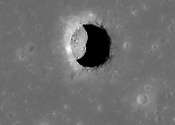
A cave discovered on the moon opens up new opportunities for settlement by humans
Almost 55 years after the launch of Apollo 11—the first mission to land humans on the moon—scientists have found evidence of a large cave system near the landing site of those astronauts.
Astronomy
Jul 27, 2024
1
364
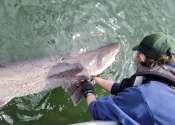
Two shark species documented in Puget Sound for first time
Oregon State University researchers have made the first scientific confirmation in Puget Sound of two distinct shark species, one of them critically endangered.
Plants & Animals
Jul 27, 2024
1
241
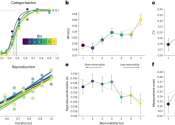
Experiments reveal that image memorability can sharpen our sense of time
Research by George Mason professor Martin Wiener recently demonstrated that the more memorable an image is, the longer and more accurately its viewers can perceive the passage of time. In a series of experimental studies, ...
Social Sciences
Jul 27, 2024
0
73

Spacecraft to swing by Earth, moon on path to Jupiter
A spacecraft launched last year will slingshot back around Earth and the moon next month in a high-stakes, world-first maneuver as it pinballs its way through the solar system to Jupiter.
Space Exploration
Jul 27, 2024
0
57

New process uses light and enzymes to create greener chemicals
Researchers at the Center for Advanced Bioenergy and Bioproducts Innovation (CABBI) have achieved a significant breakthrough that could lead to better—and greener—agricultural chemicals and everyday products.
Materials Science
Jul 27, 2024
0
77

Outsourcing conservation in Africa: NGO management reduces poaching and boosts tourism, but raises risks for civilians
There's an experiment going on in conservation in Africa. With biodiversity imperiled, and nations facing financial and political crises, some governments are transferring the management of protected areas to private, non-governmental ...
Ecology
Jul 27, 2024
0
21
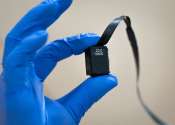
Non-invasive device uses magnetoneurography to record involuntary nervous system
A research team led by UC San Diego has, for the first time, shown that a wearable, non-invasive device can measure activity in human cervical nerves in clinical settings.
Neuroscience
30 minutes ago
0
0

Short-term vegan diet associated with reductions in biological age estimates
Eating a vegan diet for eight weeks is associated with reductions in biological age estimations based on levels of DNA methylation—a type of chemical modification of DNA (known as an epigenetic modification) that alters ...
Medical research
9 hours ago
0
42

The Future is Interdisciplinary
Find out how ACS can accelerate your research to keep up with the discoveries that are pushing us into science’s next frontier
 Medical Xpress
Medical Xpress

New push for mRNA bird flu vaccine development: WHO

Blood tests for Alzheimer's may be coming to your doctor's office. Here's what to know

COVID-19 drives high mortality rate in Australia

Is free genetic testing really free?

Hypertensive disorders of pregnancy increasing in Canada, finds study

Evidence-based information combats misleading and false claims about the anti-Mullerian hormone test

Q&A: How a stem cell bank is helping scientists understand psychiatric disorders

New study shows 'dancing molecules' can regenerate cartilage in 3 days

BRCA1/2: Why men should be screened for the 'breast cancer gene'

'Prelude' to neuromuscular disease spinal muscular atrophy may offer chances for better treatment
 Tech Xplore
Tech Xplore

Study explores win–win potential of grass-powered energy production

Memristive radiofrequency switches show improved performance for mmWave applications

Using AI to train AI: Model collapse could be coming for LLMs, say researchers

Scientists' innovation for indoor solar cells maximizes the use of light energy

Study identifies biomarker that could predict whether colon cancer patients benefit from chemotherapy
Many people with stage II or III colon cancer receive additional, or adjuvant, chemotherapy following surgery. However, clinical trials have shown that this treatment doesn't improve the chances of survival for every patient. ...
Oncology & Cancer
Jul 27, 2024
0
68

Exploring what happens when different spherical objects hit the water
When an object hits a body of water vertically, it is accompanied by a strong hydrodynamic force fueled by the flow of water around it, which propels it forward. The magnitude of this force is known to vary depending on the ...

New study disputes Hunga Tonga volcano's role in 2023–24 global warm-up
New research from a collaborative team featuring Texas A&M University atmospheric scientist Dr. Andrew Dessler is exploring the climate impact of the 2022 Hunga Tonga volcano eruption and challenging existing assumptions ...
Earth Sciences
Jul 26, 2024
2
534

Communicating numbers boosts trust in climate change science, research suggests
The intuition to distill hard numbers like "90 percent" into words like "almost all" may help make science and statistics more accessible, but new research shows that isn't necessarily the best way to engage people online.
Education
Jul 26, 2024
2
116

Physicists introduce method for mechanical detection of individual nuclear decays
In recent years, physicists and engineers have developed increasingly sophisticated instruments to study particles and the interactions between them with high precision. These instruments, which include particle detectors, ...
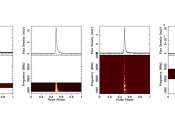
Study sheds more light on the nature of pulsar PSR J1227−6208
Astronomers from the Max Planck Institute for Radio Astronomy (MPIfRA) in Bonn, Germany and elsewhere have inspected a recycled pulsar known as PSR J1227−6208. The new study, published July 18 on the preprint server arXiv, ...

Central nervous system-associated macrophages could modulate post-stroke immune responses
An ischemic stroke is a type of stroke that occurs when a blood clot in an artery, also known as thrombus, or the progressive narrowing of arteries, blocks the blood and oxygen flowing to the brain. This process can cause ...

New study shows 'dancing molecules' can regenerate cartilage in 3 days
In November 2021, Northwestern University researchers introduced an injectable new therapy, which harnessed fast-moving "dancing molecules," to repair tissues and reverse paralysis after severe spinal cord injuries.
Biomedical technology
Jul 26, 2024
0
152

Twisted carbon nanotubes could achieve significantly better energy storage than advanced lithium-ion batteries
An international team of scientists, including two researchers who now work in the Center for Advanced Sensor Technology (CAST) at UMBC, has shown that twisted carbon nanotubes can store three times more energy per unit mass ...
Nanomaterials
Jul 26, 2024
0
391

New clam species discovered in South Africa's kelp forest
A new study sheds light on the unexplored diversity of galeommatoidean bivalves, a little-known group of marine mollusks, from the western coast of South Africa.
Plants & Animals
Jul 26, 2024
0
366

Wind, temperatures pick up as fire scorches northern California
Crews continued to fight a massive fire in northern California on Sunday, as authorities in the western US state warned of increasing winds and rising daytime temperatures.

The Galapagos Islands and many of their unique creatures are at risk from warming waters
Warm morning light reflects from the remains of a natural rock arch near Darwin Island, one of the most remote islands in the Galapagos. In clear, deep blue water, thousands of creatures—fish, hammerhead sharks, marine ...

AI-powered weather and climate models are set to change the future of forecasting, researchers say
A new system for forecasting weather and predicting future climate uses artificial intelligence (AI) to achieve results comparable with the best existing models while using much less computer power, according to its creators.

Hubble images NGC 3430, a classic spiral galaxy
This NASA/ESA Hubble Space Telescope image treats viewers to a wonderfully detailed snapshot of the spiral galaxy NGC 3430 that lies 100 million light-years from Earth in the constellation Leo Minor.

Bearded fireworm stalks shallows as Mediterranean warms
The fish in Alfonso Barone's net are hauled aboard off Sicily half- eaten, ravaged by bearded fireworms, a voracious predator flourishing in the increasingly warm Mediterranean sea.

Endangered gazelles find Libyan 'safe haven'
Cocooned in white bags and nestled in the arms of volunteers, eight young rhim gazelles—an endangered species native to North Africa—have been transferred to an uninhabited Libyan island.

California fire rapidly reaches state's top 10 biggest ever
A fire raging out of control in northern California has rapidly become among the biggest ever in the western US state, authorities said Saturday.

Ghosts of species past: Shedding new light on the demise of NZ's moa can help other flightless birds
New Zealand was once home to giant flightless birds called moa. They had grown accustomed to life without predators. So the arrival of humans in the mid-13th century presented a massive—and ultimately insurmountable—challenge ...

Komodo dragons have iron-coated teeth to rip apart their prey, researchers find
Scientists have discovered that the serrated edges of Komodo dragons' teeth are tipped with iron. Led by researchers from King's College London, the study gives new insight into how Komodo dragons keep their teeth razor-sharp ...

Fossil algae show a lake once existed on Lesotho's Mafadi summit, but it vanished about 150 years ago
Lesotho is a small, land-locked, mountainous country located in the middle of South Africa. Its Eastern Lesotho Highlands are often referred to as the region's "water tower" because they receive some of the highest rainfall ...

NASA Mars rover captures rock that could hold fossilized microbes
NASA's Perseverance Mars rover has made what could be its most astonishing discovery to date: possible signs of ancient life on the Red Planet.

Philippine coast guard says oil leaking from sunken tanker
Some of the 1.4 million liters of industrial fuel oil inside a sunken Philippine tanker has started to leak into Manila Bay, the coast guard said Saturday, as they raced to avoid an environmental catastrophe.

Thousands evacuate season's biggest wildfire in northern California
A huge, fast-moving and rapidly growing wildfire in northern California has forced more than 4,000 people to evacuate as firefighters battle gusty winds and perilously dry conditions, authorities said Friday.

Developing a nano-treatment to help save mangroves from deadly disease
Mangroves and palm trees are hallmarks of the Sunshine State not just for their beauty but for their immense importance to Florida's coastlines.

Exploring cadmium-induced alterations in the expression profile of microRNAs
Cadmium (Cd), a toxic heavy metal, has been identified as a significant environmental pollutant due to its widespread industrial use and persistence in the environment. Chronic exposure to Cd poses a considerable threat to ...

New aerospace and building materials could repair themselves thanks to fungi and bacteria
Researchers are using biological matter to create unique new materials that can adapt to their environment and repair themselves.

Exploring the effects of initial microbiota on microbial succession during eggplant fermentation
Shibazuke is a traditional Japanese eggplant pickle produced by the process of fermentation using lactic acid bacteria (LAB). LAB which are commonly present in vegetables cause the spontaneous fermentation of vegetables, ...

What's really behind the ad label? The dark arts influencers are using to get your likes
Rogue social media influencers are relying on gender stereotypes, bogus claims and deceptive editing to monetize their content and increase their following, a new study has found.

Study warns of rise of 'new chauvinism' fueled by right-wing populism
New research from the University of Bath has identified a "new chauvinism," fueled by a resurgence in right-wing populism, and distinguished by the use of softer, more subtle language than traditional chauvinism.

New research on legal aid cuts shows wasted money and 'embarrassing' data gaps in UK
There needs to be "significant improvements" to the way data is collected across UK Government to prove if major changes to legal aid have delivered value for money to the taxpayer, a new report says.






































































